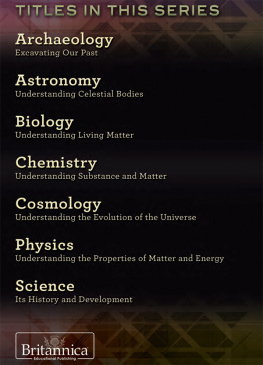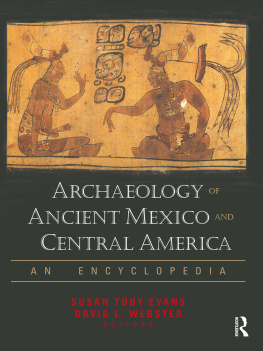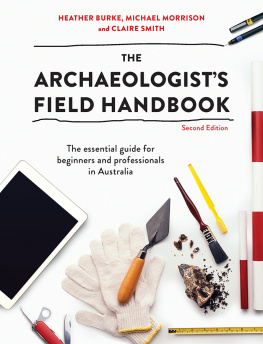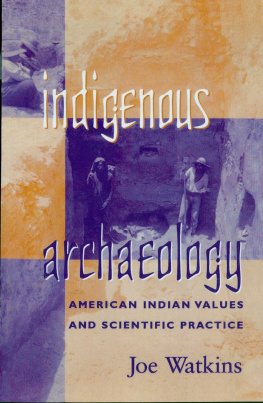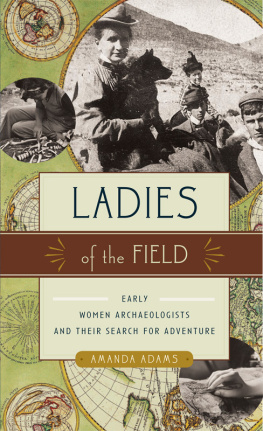First published 2014 by Left Coast Press, Inc.
Published 2016 by Routledge
2 Park Square, Milton Park, Abingdon, Oxon OX14 4RN 711
Third Avenue, New York, NY 10017, USA
Routledge is an imprint of the Taylor & Francis Group, an informa business
Copyright 2014 Taylor & Francis
All rights reserved. No part of this book may be reprinted or reproduced or utilised in any form or by any electronic, mechanical, or other means, now known or hereafter invented, including photocopying and recording, or in any information storage or retrieval system, without permission in writing from the publishers.
Notice:
Product or corporate names may be trademarks or registered trademarks, and are used only for identification and explanation without intent to infringe.
Library of Congress Cataloging-in-Publication Data
Webster, Chris, 1975
Field archaeologists survival guide: getting a job and working in cultural resource management / by Chris Webster.
pages cm
Includes bibliographical references and index.
ISBN 978-1-61132-928-5 (pbk. : alk. paper)ISBN 978-1-61132-930-8 (consumer ebook)
1. ArchaeologyVocational guidance. 2. ArchaeologyFieldwork. 3. Cultural propertyProtection. 4. AntiquitiesCollection and preservation. I. Title.
CC107.W43 2014
930.1--dc23
2014002535
ISBN: 978-1-611-32928-5 (pbk)
ISBN: 978-1-315-42845-1 (ebk)
C ultural resource management (CRM) archaeology is a fun and rewarding job if you want it to be. We choose when and where we want to work. If we want to move to a different city, state, or region, we pick up and go. Want to excavate pueblos in the southwest? Go for it. Want to do long surveys in the high desert of Nevada? No problem. We are masters of our own destinies. We take vacations when we want to, and powerful people with high-paying jobs want to be us. Why, then, do people leave this field? Why are most of the field technicians you meet in their twenties?
The problem is that field technicians are never taught how to live on the road. They come out of college filled with idealized visions of what it is like to be an archaeologist, and when they get to their first project, the shocking reality sets in. After a 10-day session of eating gas station breakfast burritos and other fast food, most people are ready to pack it in. We stay, though, because we love this job. We love being archaeologists, and many of us wont let anything stand in the way of our goals.
This book is designed to give everyone that travels and lives on the road for a living a few ideas on how to improve their quality of life. Aside from airline pilots and traveling salespeople, I dont know of any other non-military profession where you spend so much time away from home. In fact, many archaeologists dont even have a true home to go back to. So, we live on the road, and we do our jobs.
Most of us arent taught how to write a rsum or curriculum vitae, how to write a cover letter, or what to say in an interview. We arent told about important websites like Shovelbums.org and archaeologyfieldwork. com. No one shows us how to use a compass, sketch out a map, or even what Universal Transverse Mercator coordinates are. We arent told how to get the best deals on hotels, how to make those hotels livable for many days at a time, or how to make healthy, nutritious meals on the road. This book will help with all of those things and more.
I am by no means an expert on all things related to shovelbumming or living on the road. What I am is a field archaeologist that has traveled around the country, worked many different jobs, and lived in countless hotel rooms. Ive meet a number of amazing people in my career, and Ive learned a lot from them. There have also been many mistakes along the way. Im sure Ive lost a great deal of money, time, and a certain amount of sanity by trying to figure some of this out on my own. Most of us are reluctant to ask questions because we dont want to seem like we dont know what were doing. Im no different. Thats why this book is in your hands right now though. You are asking the questions, and Im providing some of the answers.
Acknowledgements
This book would have been impossible if it werent for the help of the many field technicians and crew chiefs Ive worked with along the way. I learned from a lot of people and incorporated what they did and how they did it into my own style. One person from whom I learned a lot about companies and getting jobs is Shawn Olson. I met Shawn on my very first project, and weve been friends ever since. He was even in my wedding. For my first few years in archaeology, I always called Shawn before applying to a new company. Hed been in the business for a long time and knew just about everyone. Shawn would tell me what he knew about the company and whether I should work there or not. His advice was, and is, invaluable. Our metaphysical and science-based conversations were a welcome addition to most days in the field too.
The number of people Ive learned archaeology skills from is immeasurable. There have been so many people in so many different states that I cant keep track. I always try to take some bit of knowledge that I didnt have before from every project Ive been on. My first major excavation was in downtown Miami, and it included a lot of great archaeologists. The Well Crew, as we were known, were a great bunch of people, and I owe a lot to them. You know who you are. The friends Ive made in archaeology have all contributed in different ways to the attitude I have developed and the way I think about the profession and the people in it. The conversations Ive had on philosophical and scientific topics have been great. Some of the best conversations were had with (even though we didnt always agree on things) Blake Cochran, Deanna Dytchkowskyj, David Field, Shannon Iverson, Richard McDaniel, Shawn Olson, and too many others to list.
During the final stages of this book I asked for any tips and advice that others in the field would like to give to new shovelbums. I received some great comments from a number of people and included them in this book. Those people are Russell Alleen-Willems, Jeffrey Baker, Wilbur Barrick, Jim Christensen, John Dougherty, Justin Dunnavant, David Field, Jennifer McGuire, Brandon McIntosh, Jamie Palmer, Andrew Sewell, and Bill White.
One person that deserves my thanks, and more than I can give, is my wife, Rachel Roden. I met Rachel on my very first project, and we started dating about a year later. From then on, we traveled the country and worked on every project together until she left the field in 2011 to pursue another passion. Rachel always stuck with me through the good times and the bad. She was there when my passion got me fired and when my forcefulness created awkward situations with our supervisors. She stuck by me and encouraged me to keep going when I started my company, and I had no income for the better part of a year. Without Rachels support, this book would not have been possible.
Finally, I need to thank Brian Fagan and the publishers at Left Coast Press. After reading Fagans


